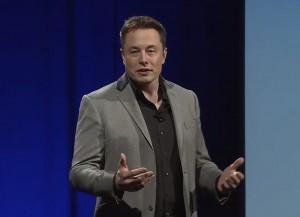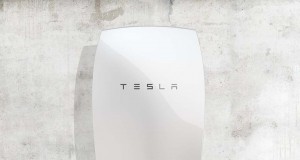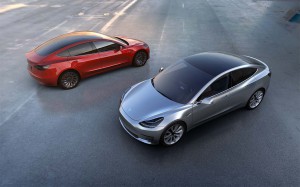
Tesla CEO Elon Musk is proposing a $3 billion acquisition by Tesla that could create a one-stop shop for people looking to get away from fossil fuels.
Elon Musk is looking to create a one-stop shop for the elimination of fossil fuels in the daily lives of people with his proposed acquisition of SolarCity Corp., a maker and installer of solar panels, by Tesla.
Never one to shy away from a controversial idea, Musk has set the bar high with this plan, which calls for Tesla to buy the company for just under $3 billion, using Tesla stock.
The plan, in a nutshell, is that SolarCity would be absorbed into the company’s Tesla Energy division, which already handles the Powerwall and Powerpack energy storage devices for homes and businesses.
“It’s now time to complete the picture,” the company posted in a blog. “Tesla customers can drive clean cars and they can use our battery packs to help consume energy more efficiently, but they still need to access the most sustainable energy source that’s available: the sun.”
While Musk believes “these synergies are very common sense,” investors and analysts seem unconvinced.
Tesla shares, however, dropped by 13% to $189.99 in extended trading last night — amounting to a loss in value of about $4.3 billion, or more than the value of the offer for Solar City. Shares of SolarCity rose about 18% to $25.02.
They rebounded a bit this morning, but not significantly. Observers rated the chance of this deal – which Musk recused himself from voting on – being approved by SolarCity and Tesla shareholders at 20% to 40%.
“We believe Tesla shareholders are likely to be opposed to the deal as the synergies are limited, any investor could obtain exposure to [Solar City]…directly today, and the capital intensity of the [Solar City] business…will increase the risk profile of [Tesla’s] business,” Credit Suisse Analyst Patrick Jobin wrote in a note to clients, noting he is “unconvinced of the strategic and financial rationale” of the deal.
(Tesla hunting for buyers at Nordstrom. For more, Click Here.)
Musk, who is the chairman for SolarCity as well as Tesla, and the largest shareholder of both companies, described the deal as a “no brainer.” The merged companies could sell customers an electric car, a home storage battery made in a plant under construction in Nevada and a solar system for roof of their houses all at once, he said.
“Instead of making three trips to a house to put in a car charger and solar panels and battery pack, you can integrate that into a single visit,” Musk told reporters in a call yesterday. “It’s an obvious thing to do.”
Critics of the deal also fear the integration of SolarCity into Tesla’s business model will ultimately dilute the focus on the automobile business, which needs constant attention and is proving more complicated than Musk’s other ventures.
Oppenheimer analyst Colin Rusch noted that while he is bullish on the solar industry, he wasn’t on Tesla. The root of his concern is that buying SolarCity isnt’ the best use of the electric carmaker’s capital and human resources, which is already needy in both areas with the advent of the company’s third vehicle, the Model 3. He downgraded Tesla to perform from outperform, and said “uncertainty around the acquisition and the resulting corporate structure will weigh heavily on the stock.”

... and power your home using its Powerwall energy storage device. Both would be charged by SolarCity-produced panels, if Musk's deal gets done.
(Click Here for details about the investigation into Tesla’s potential suspension problems.)
SolarCity has about $6.24 billion in liabilities, including debt, but Tesla representatives insisted the company’s predictable cash flow in the form of payments for its solar systems would cover the debt. The integration of solar panels into automobiles, while under consideration by automakers, isn’t expected to become standard for several more years.
Although it is the U.S. market leader in residential rooftop solar systems, SolarCity has posted a lengthening string of quarterly losses and the stock has fallen nearly 60% so far this year. Musk said today that SolarCity would be cash-flow positive in three to six months, although he did reconfirm that Tesla’s plans to be so by the end of the year have been pushed back.
Musk said Tesla did not know how many of its customers have solar panels, but guessed that most of them were likely interested in solar. In a blog, Tesla described the deal as a way to expand both companies’ markets and cut the cost of sales by as much as 50%, although Musk back tracked saying it could be as low as a 20% improvement.
Under Musk’s plan for the two companies, the solar systems will be sold under the premium Tesla brand, which is seeking to expand its target market with a $35,000 electric vehicle called the Model 3 that it will begin delivering late next year.
(Tesla offering new $50K Model S. Click Here for the story.)
Musk, who owns 19% of Tesla and 22% of SolarCity, said he would recuse himself from voting on the deal. He could not say how soon shareholders could vote on the deal, as due diligence needs to take place first.
Michael Strong contributed to this report.


I can hear critics of the group herd mentality investing mooing negative comments of unrealistic synergy. Yet the energy picture of finite fossile energy and alternative infinite energy sources has drastically changed. Elon Musk is simply making the connections that many people with solar and EV and battery storage have come to the same conclusion. No longer being a revenue stream for finite energy companies and espicially wall investment middleman greed that add no value except their supposed expertise of understanding technology to invest only for continued reliance of payment to the first to get there. Not only energy independence but also financial independence.
I agree DWH. It would appear those who are boo-hooing this deal are those who are heavy into fossil fuel investing, i.e. sitting back and letting the oil ride to high profits.
I’ve found most “experts” who boo-hoo stocks actually investing in the companies, trying to downplay them to buy on the cheap.
Elon Musk doesn’t do things by the old status-quo book; he’s writing his own. Good for him.